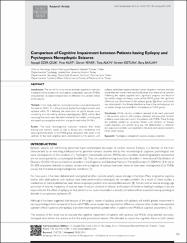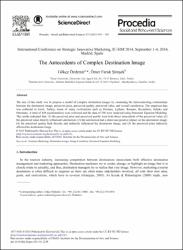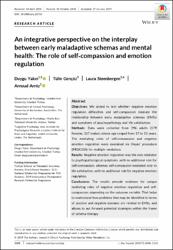Ara
Toplam kayıt 111, listelenen: 1-10
The prediction level of mindfulness and locus of control on subjective well-being
(2013)
The purpose of this study is to examine whether mindfulness and locus of control predict subjective well-being at a significant level.The population of the study consists of university students, and the study sample is ...
Effects of childhood trauma and clinical features on determining quality of life in patients with bipolar i disorder
(Elsevier, 2014)
Background: We explored how childhood trauma (CHT) affects the clinical expression of disorder and quality of life in patients with bipolar I (BP-I) disorder. Methods Euthymic patients (n=116) who subsequently received a ...
Comparison of Cognitive Impairment between Patients having Epilepsy and Psychogenic Nonepileptic Seizures
(AVES, 2015)
Introduction: The aim of this study was to evaluate cognitive impairment in patients having epilepsy or psychogenic nonepileptic seizures (PNESs) using selected neuropsychological tests at different time periods related ...
The Antecedents of Complex Destination Image
(Elsevier Science, 2015)
The aim of this study was to propose a model of complex destination images by examining the interconnecting relationships between the destination image, perceived price, perceived quality, perceived value, and overall ...
A Roadside Study of Observable Driver Distractions
(Taylor&Francis, 2015)
Objective: This study investigated the prevalence of observable distractions while driving and the effect of drivers' characteristics and time-related variables on their prevalence. Methods: Using roadside observation, 2 ...
A Neural Marker of the Start-Gun in Interval Timing: Onset N1P2
(AMER PSYCHOLOGICAL ASSOC, 2019)
Although the neural markers of interval timing have been widely studied, the events that determine the onset and offset of an interval have only recently started to gain attention. In the present study, I compare the ...
N1-P2: Neural markers of temporal expectation and response discrimination in interval timing
(NENCKI INST EXPERIMENTAL BIOLOGY, 2019)
Humans use temporal regularities in their daily life to act in accordance with future events in the most efficient way. To achieve this, humans build temporal expectations and determine a template action that is in line ...
Linguistic Reflections on Psychotherapy: Change in Usage of The First Person Pronoun in Information Structure Positions
(Springer, 2018-08)
Aim of present study was to understand changes in speech of clients with regard to certain linguistic features from 5th to 15th session of psychotherapy. First person pronoun use in information structure positions were ...
An integrative perspective on the interplay between early maladaptive schemas and mental health: The role of self-compassion and emotion regulation
(Wiley, 2019-06)
Objectives We aimed to test whether negative emotion regulation difficulties and self-compassion mediate the relationship between early maladaptive schemas (EMSs) and symptoms of psychopathology and life satisfaction. ...




















